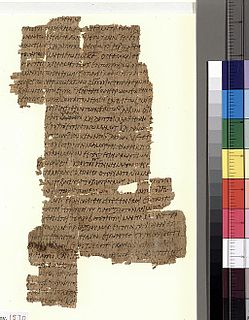
Matthew 26 is the 26th chapter of the Gospel of Matthew, part of the New Testament of the Christian Bible. This chapter covers the beginning of the Passion of Jesus narrative, which continues to Matthew 28; it contains the narratives of the Jewish leaders' plot to kill Jesus, Judas Iscariot's agreement to betray Jesus to Caiphas, the Last Supper with the Twelve Apostles, the Agony in the Garden of Gethsemane and the subsequent vindication of Jesus' predictions.

John 17 is the seventeenth chapter of the Gospel of John in the New Testament of the Christian Bible. It portrays a prayer of Jesus Christ addressed to his Father, placed in context immediately before his betrayal and crucifixion, the events which the gospel often refers to as his glorification. Methodist theologian Joseph Benson calls this prayer "Our Lord’s Intercessory Prayer", because "it is considered as a pattern of the intercession he is now making in heaven for his people". The New King James Version divides this chapter into three sections:

Luke 11 is the eleventh chapter of the Gospel of Luke in the New Testament of the Christian Bible. It records Luke's version of the Lord's Prayer and several parables and teachings told by Jesus Christ. The book containing this chapter is anonymous, but early Christian tradition uniformly affirmed that Luke the Evangelist composed this Gospel as well as the Acts of the Apostles.
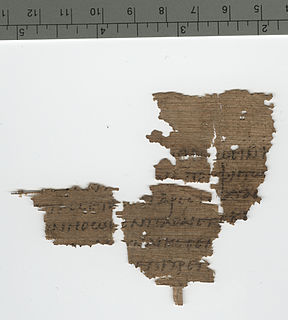
1 Corinthians 14 is the fourteenth chapter of the First Epistle to the Corinthians in the New Testament of the Christian Bible. It is authored by Paul the Apostle and Sosthenes in Ephesus. In this chapter, Paul writes about the gift of prophesy and about speaking in tongues. Biblical scholar F. Dale Bruner states that "edification becomes the theme of this chapter: in Paul's thought, the ultimate criterion for a gift of the Spirit is this: Does it upbuild the church?"

James 1 is the first chapter of the Epistle of James in the New Testament of the Christian Bible. The author identifies himself as "James, a servant of God and of the Lord Jesus Christ" and the epistle is traditionally attributed to James the brother of Jesus, written in Jerusalem between AD 48 and 61. Alternatively, some scholars argue that it is a pseudographical work written after AD 61.
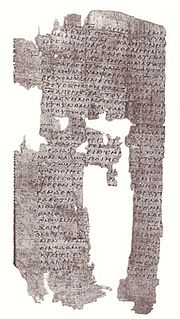
1 Corinthians 7 is the seventh chapter of the First Epistle to the Corinthians in the New Testament of the Christian Bible. It is authored by Paul the Apostle and Sosthenes in Ephesus. In this chapter, Paul replies to certain questions raised by the Corinthian church in a letter sent to him.

2 Corinthians 4 is the fourth chapter of the Second Epistle to the Corinthians in the New Testament of the Christian Bible. It is authored by Paul the Apostle and Timothy in Macedonia in 55–56 CE. Twice in this chapter this sentence occurs: "Therefore, we do not lose heart".

2 Corinthians 12 is the twelfth chapter of the Second Epistle to the Corinthians in the New Testament of the Christian Bible. It is authored by Paul the Apostle and Timothy in Macedonia in 55–56 CE.
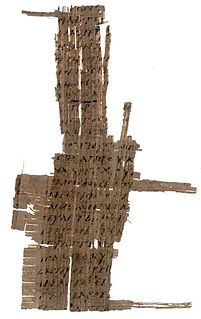
Galatians 6 is the sixth chapter of the Epistle to the Galatians in the New Testament of the Christian Bible. It is authored by Paul the Apostle for the churches in Galatia, written between 49–58 CE. This chapter contains Paul's exhortations and also a summary of the key points in the epistle.

Ephesians 5 is the fifth chapter of the Epistle to the Ephesians in the New Testament of the Christian Bible. Traditionally, it is believed to be written by Apostle Paul while he was in prison in Rome. More recently, it is suggested to be written between AD 80 and 100 by another writer using Paul's name and style, however this theory is not widely accepted. This chapter is a part of Paul's exhortation, with the particular section about how Christians should live in the world (4:17–5:20) and in their responsibilities as households (5:21–6:9).
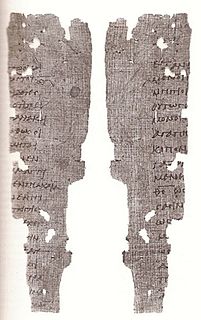
1 Thessalonians 1 is the first chapter of the First Epistle to the Thessalonians in the New Testament of the Christian Bible. It is authored by Paul the Apostle, likely written in Corinth in about 50-51 AD for the church in Thessalonica. This chapter contains the prescript and Paul's thanksgiving for the church.

1 Thessalonians 5 is the fifth chapter of the First Epistle to the Thessalonians in the New Testament of the Christian Bible. It is authored by Paul the Apostle, likely written in Corinth in about 50-51 CE for the church in Thessalonica. This chapter contains a message about Christ's second coming, and various final exhortations and greetings.
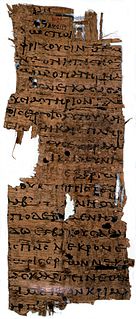
James 2 is the second chapter of the Epistle of James in the New Testament of the Christian Bible. The author identifies himself as "James, a servant of God and of the Lord Jesus Christ" and the epistle is traditionally attributed to James the brother of Jesus, written in Jerusalem between 48 and 61 CE. Alternatively, some scholars argue that it is a pseudographical work written after 61 CE. This chapter contains an exposition about the commandment, "You shall love your neighbour as yourself", and about dead faith.

James 3 is the third chapter of the Epistle of James in the New Testament of the Christian Bible. The author identifies himself as "James, a servant of God and of the Lord Jesus Christ" and the epistle is traditionally attributed to James the brother of Jesus, written in Jerusalem between 48 and 61 CE. Alternatively, some scholars argue that it is a pseudographical work written after 61 CE. This chapter contains an exposition about wisdom and humility.

James 4 is the fourth chapter of the Epistle of James in the New Testament of the Christian Bible. The author identifies himself as "James, a servant of God and of the Lord Jesus Christ" and the epistle is traditionally attributed to James the brother of Jesus, written in Jerusalem between 48 and 61 CE. Alternatively, some scholars argue that it is a pseudographical work written after 61 CE. This chapter continues a directive on wisdom and humility from chapter 3, followed by a warning to the rich.

Revelation 2 is the second chapter of the Book of Revelation or the Apocalypse of John in the New Testament of the Christian Bible. The book is traditionally attributed to John the Apostle, but the precise identity of the author remains a point of academic debate. This chapter contains messages to churches of Ephesus, Smyrna, Pergamum and Thyatira, four of the seven churches of Asia located in modern-day Turkey, with messages for the other three churches appearing in chapter 3.
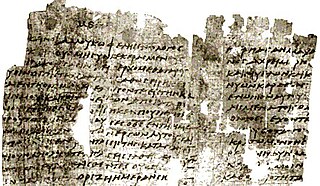
Hebrews 7 is the seventh chapter of the Epistle to the Hebrews in the New Testament of the Christian Bible. The author is anonymous, although the inrnal reference to "our brother Timothy" causes a traditional attribution to Paul, but this attribution has been disputed since the second century and there is no decisive evidence for the authorship. This chapter contains the exposition about the superiority of Christ's Priesthood through Melchizedek to the Levitical Priesthood.

Hebrews 9 is the ninth chapter of the Epistle to the Hebrews in the New Testament of the Christian Bible. The author is anonymous, although the internal reference to "our brother Timothy" causes a traditional attribution to Paul, but this attribution has been disputed since the second century and there is no decisive evidence for the authorship. This chapter contains the exposition about the ministry of the first covenant and Christ's effective sacrifice.

Revelation 8 is the eighth chapter of the Book of Revelation or the Apocalypse of John in the New Testament of the Christian Bible. The book is traditionally attributed to John the Apostle, but the precise identity of the author remains a point of academic debate.

1 Kings 18 is the eighteenth chapter of the Books of Kings in the Hebrew Bible or the First Book of Kings in the Old Testament of the Christian Bible. The book is a compilation of various annals recording the acts of the kings of Israel and Judah by a Deuteronomic compiler in the seventh century BCE, with a supplement added in the sixth century BCE. This chapter belongs to the section comprising 1 Kings 16:15 to 2 Kings 8:29 which documents the period of Omri's dynasty. The focus of this chapter is the activity of prophet Elijah during the reign of king Ahab in the northern kingdom.


















